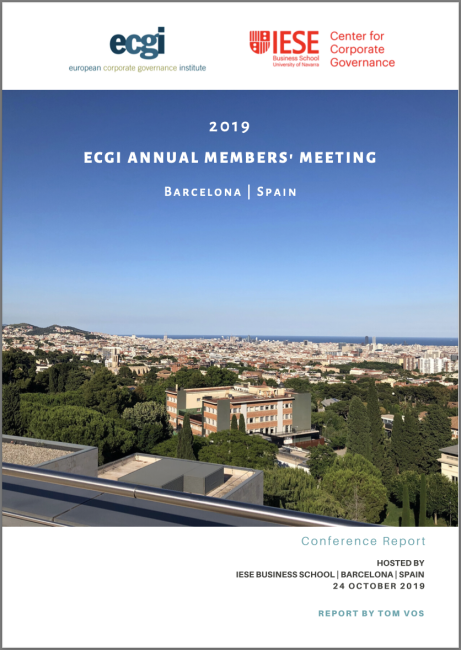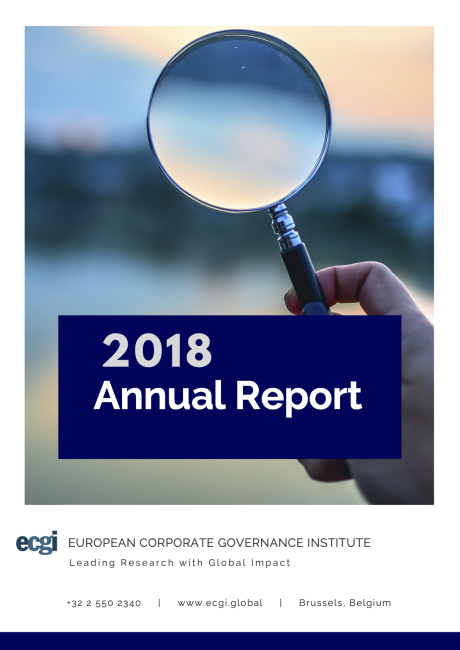Culture, Ideology and Stewardship in focus at the 2019 ECGI Members' Meeting

ECGI held its Annual Members’ Meeting in Barcelona on 24 October 2019, bringing together international academics and practitioners in the field of corporate governance for a programme that included a general assembly, a lecture, a panel discussion, presentation of the two best papers in 2018 and a dinner.
The event was hosted by IESE Business School, Barcelona. The annual lecture was delivered by Professor Paola Sapienza (Kellogg School of Management and ECGI). Professor Sapienza’s lecture was entitled “The Economics of Firm Culture”. Following the lecture there was a panel discussion moderated by Prof. Marco Becht (ULB and ECGI) with Dr. Beatrice Engström-Bondy (Investor AB) and Professor Sapienza.
The two sessions served to highlight the significance of corporate culture, noting its potential to provide intrinsic motivation, increased productivity and reduced costs, while highlighting the enormous risks when it is perceived to go awry. The endogeneity problem was underlined as the key challenge for empirical studies on the topic, as they seek to define positive or negative culture in an attempt to correlate this with performance and other outcomes. Some of the many factors contributing to corporate culture include local culture and the identity of workers, stated or taught values, hiring and training policies, and the influence of a leader with their own social identity. Some practical steps were also offered for fostering a positive corporate culture that can work across sectors, beliefs, and geography. These include creating a dialogue and a network along with a sense of pride and inclusivity across the group. It is also helpful to have an owner that employees can identify with, and a majority shareholder with a long-term view.
Following these sessions, ECGI awarded prizes for the best papers in the Finance and Law Working Paper Series’ from the previous year. The Finance Series prize of EUR 5,000, which is sponsored by Aberdeen Standard Investments, the global fund manager, was awarded to Professors Patrick Bolton (Columbia University), Tao Li (University of Florida), Enrichetta Ravina (Northwestern University) and Howard Rosenthal (New York University), for their paper on “Investor Ideology” (ECGI Finance Working Paper 557/2018). The prize was collected by Prof. Enrichetta Ravina who presented the findings of their paper.
The study is a novel approach to analysing the voting patterns of institutional investors, not in a political sense, but in a way that is internally consistent across issues. They map two dimensions, with the first being a 'socially versus profit-oriented' dimension. The investors on the left support more socially and environmentally friendly proposals and tend to vote more often against say-on-pay proposals; while the investors on the right are more money conscious and vote against proposals that may cost shareholders money. The second dimension considers 'management disciplinarian investors versus more management friendly investors'. The paper shows that preferences of shareholders are heterogenous and it does not assume that investors vote to maximize shareholder value. It was noted that it is currently still unclear whether this heterogeneity reflects different views on how to best accomplish the same objective of maximizing shareholder value, or whether the investors on the left also have a different objective than maximizing only shareholder value.
The Law Series prize of EUR 5,000, sponsored by Cleary Gottlieb Steen Hamilton, the international law firm, was awarded to Professors Lucian Bebchuk (Harvard Law School, NBER, CEPR and ECGI) and Scott Hirst (Boston University, Harvard Law School) for their paper on “Index Funds and the Future of Corporate Governance: Theory, Evidence, and Policy” (ECGI Law Working Paper 433/2018).
The paper seeks to provide a comprehensive theoretical, empirical, and policy analysis of index fund stewardship. The paper puts forward an agency-costs theory of index fund incentives showing that index fund managers have strong incentives to (i) underinvest in stewardship and (ii) defer excessively to the preferences and positions of corporate managers. The paper also provides an empirical analysis of the full range of stewardship activities that index funds do and do not undertake, focusing on the three largest index fund managers. This body of evidence is, on the whole, consistent with the incentive problems that the paper’s agency-costs framework identifies. The paper puts forward a set of reforms that policymakers should consider in order to address the incentives of index fund managers to underinvest in stewardship, their incentives to be excessively deferential to corporate managers, and the continuing rise of index investing. The paper also discusses how its analysis should reorient important ongoing debates regarding common ownership and hedge fund activism.
The ECGI Members’ dinner took place that evening, with Francisco Reynés Massanet (Naturgy), providing the after-dinner speech to an audience of ECGI members and invited guests. Mr. Reynés provided many insightful observations reflecting on his experience as CEO and Chair of a listed energy company. He emphasised that corporate governance is about helping companies to last forever, it is something that is there to help the CEO, and its importance is also recognised by the market. He pointed to the board of directors as a key actor that must support the long-term purpose of the company, being the place where the interests of the different shareholders, who have different visions and different time horizons, are discussed and where a solution to these differences is negotiated. He further stressed that it is important that all of the directors have the same objective of taking the best decisions for the corporation, regardless of which shareholder they represent, as is also their legal duty.
The Annual Members' Meeting concluded after the dinner.


